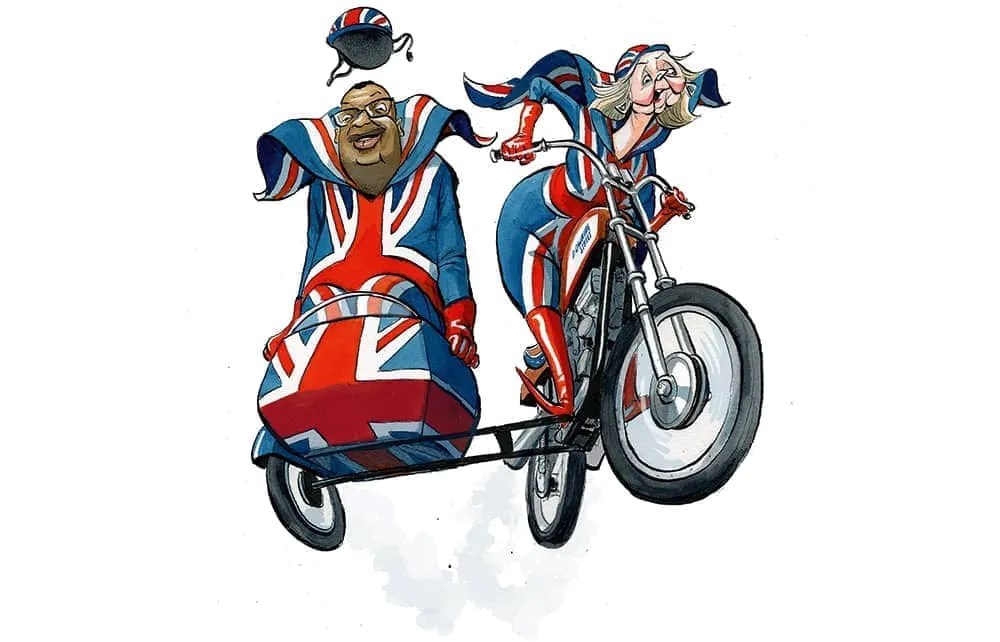Levelling Up secretary Simon Clarke described today’s fiscal event as a ‘game changer’ for Britain’s economy. Was he right?
The announcement from Chancellor Kwasi Kwarteng was not so much an ‘event’ as a major Budget, which ushered in £45 billion worth of tax cuts – the ‘biggest tax cutting event since 1972’, according to the Institute for Fiscal Studies.
It’s a remarkable tax-cutting Budget, with praise coming in thick and fast from the free-market think tanks
All that was expected was announced: the National Insurance levy brought in for health and social care – which came in back in April – will be scrapped from 6 November. The planned corporation tax rise for big, profitable businesses will not go ahead: the rate will stay at 19 per cent, ‘the lowest rate of corporation tax in the G20’, according to Kwarteng.
The bankers’ bonus cap has been scrapped, with Kwasi defending the decision on the basis that it only harmed the UK’s ability to attract and keep talent. ‘All the bonus cap did was to push up the basic salaries of bankers, or drive activity outside Europe,’ said Kwarteng. ‘It never capped total remuneration, so let’s not sit here and pretend otherwise. So we’re going to get rid of it.’
Stamp duty has been reduced, although not scrapped as some were speculating. The threshold for full relief has doubled from £125,000 to £250,000, while for first-time buyers it’s risen to £425,000; this latter group will now also keep their exemptions on a property worth up to £625,000, a rise from £500,000. Arguably these changes are closer to tinkering than game-changing, especially for areas like the south east, where the root cause of the housing crisis remains an undersupply of homes. Kwarteng insisted that more details for planning reform were forthcoming, which would include an ‘increase (in) the disposal of surplus government land to build new homes’.
Then there was the announcement that was not expected: the announcement which sums up this government’s new economic agenda. Next April, when the basic rate of tax drops from 20p to 19p (a tax cut brought forward from 2024), the 45p tax rate will also be abolished completely, returning the top rate of tax to its 2009 level of 40p. Fraser Nelson has the details here, where he digs into Kwarteng’s decision to use his political capital on this decision.
It’s a remarkable tax-cutting Budget, with praise coming in thick and fast from the free-market think tanks. The Taxpayers’ Alliance calls it ‘the most taxpayer-friendly budget in recent memory’.
How much does it cost to deliver? The £45 billion of tax cuts come alongside the various energy support schemes announced by the government. The Treasury estimates this creates an additional £70 billion hole in the public finances that it plans to add onto borrowing. According to Capital Economics, public borrowing will be up to ‘£237.7 billion (9.3 per cent of GDP) in 2022/23,’ compared to the £133.7 billion forecast in March and will still be well above £100 billion by 2024/25.’
These announcements certainly mark a change for the Tory party’s economic vision, and show Truss’s willingness to engage in ideological battles too. It’s certainly a shift from the Boris Johnson years, when then-chancellor Rishi Sunak targeted his major tax changes around the lowest-paid, through the universal credit taper. But it’s also a shift from the Cameron-coalition era, when being so explicitly free market was considered passé.
‘For too long in this country, we have indulged in a fight over redistribution,’ said Kwarteng at the end of today’s announcements. ‘Now, we need to focus on growth, not just how we tax and spend. We won’t apologise for managing the economy in a way that increases prosperity and living standards.’
But it also well and truly marks the end of certain principled arguments around debt and borrowing, too. Truss’s Tory party has confirmed that tax cuts come above all else, including the health of the public finances.







Comments